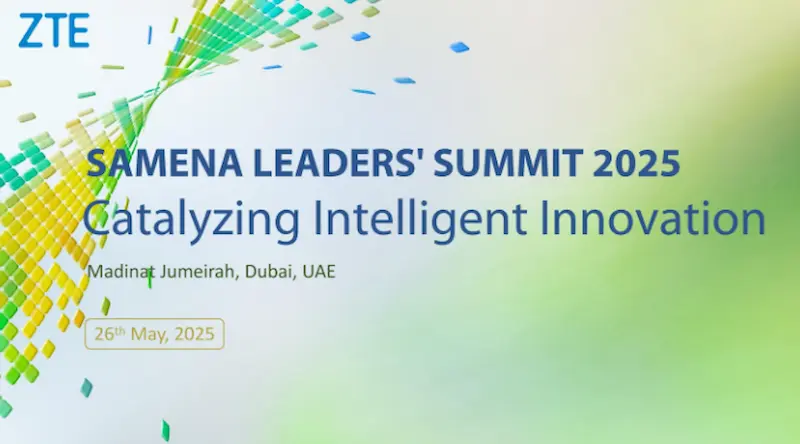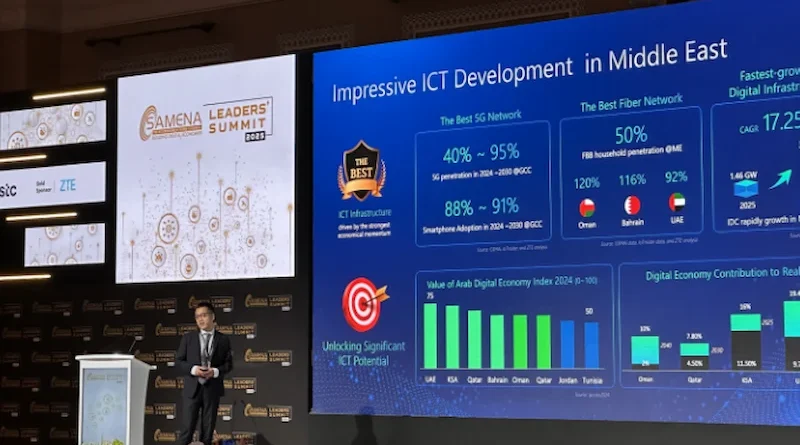ZTE Corp Highlights Strategic Vision at SAMENA Leaders’ Summit 2025 in Dubai
ZTE Corp reaffirmed its strategic role in enabling digital transformation across the Middle East and Africa by participating in the SAMENA Leaders’ Summit 2025 in Dubai. Under the theme “Catalyzing Intelligent Innovation,” the company presented integrated innovations in connectivity, computing power, and artificial intelligence. This annual summit, hosted by the SAMENA Council, brought together government stakeholders, telecom operators, and technology firms to explore pathways for sustainable digital development in the SAMENA region.
Significance of the SAMENA Leaders’ Summit
Established in 2006, the SAMENA Telecommunications Council has become a unifying platform for digital policy makers and infrastructure providers across South Asia, the Middle East, and North Africa. The 2025 edition of its annual summit addressed digital economy acceleration, future-oriented technologies, and regional collaboration strategies.
A Strategic Forum for Regional ICT Dialogue
Held in Dubai, the summit convened ministers, regulators, enterprise executives, and innovators to assess the direction of telecom modernization. It provided insight into how regional economies are aligning with global connectivity standards while accounting for diverse infrastructure capabilities.
Addressing 2030 Priorities Through Innovation
With global attention turning toward 2030 sustainable development benchmarks, the summit placed strong emphasis on building digital inclusion and future-ready networks. These goals are of particular relevance to the SAMENA region, where diverse geographies and investment profiles influence national technology roadmaps.
This year’s Summit, held under the theme “Intelligent & Sustainable Transformation of Digital Economies,” took place at a pivotal time. Agentic AI, intelligent networks, and data-driven policy begin to influence how collaboration, infrastructure planning, network monetization, application ecosystems, and regulation are approached.
The year 2025 represents a key milestone in global digital progress, particularly in relation to the UN Sustainable Development Agenda. So, the Summit focused on aligning stakeholders around the technologies, priorities, networks, and models for business and governance that are expected to shape the next phase of digital transformation across the region.
ZTE Corp’s Focus on Integrated ICT Solutions

As a global provider of ICT systems and services, ZTE Corp used the summit platform to display its leadership in next-generation networks and intelligent systems. The company outlined its strategy based on the fusion of “Connectivity + Computing Power + Capabilities + Intelligence.”
Exhibition of 5G-Advanced and Broadband Technologies
ZTE’s exhibit featured a lineup of infrastructure products suited to urban and rural deployment scenarios:
- 5G-Advanced platforms offering higher capacity and lower latency
- 50G PON fixed broadband for enhanced residential and enterprise internet
- Data center-ready AI computing platforms
- AI-based terminal products for communication, control, and service access
The range of displayed products demonstrated the company’s ability to deliver solutions adaptable to a broad range of national contexts.
Vision for Regional Digital Transformation
A key component of ZTE’s participation was articulating how its technologies support region-specific development needs.
Integrated Solutions for MEA
Chen Qiong, Chief Technology Officer for ZTE’s Middle East and Africa region, delivered a keynote focused on ZTE’s vision of unified ICT infrastructure. He explained that the “Network + Computing + AI” model represents more than just integration. It offers a blueprint for cross-industry and cross-market adoption of digital infrastructure.
Chen emphasized that ZTE’s portfolio enables governments and operators to build scalable platforms for smart cities, connected transport, industrial automation, and digital health. These systems support service innovation while reducing barriers to entry for smaller markets.
Addressing Divergent Needs Across the Region
In the Gulf countries, where digital economy frameworks are maturing, ZTE’s capabilities support advanced verticals. In the UAE and Saudi Arabia, ZTE solutions enable applications in public safety, education, and logistics.
In Africa, ZTE technologies are being evaluated to help bridge service access gaps. By deploying hybrid wireless and broadband networks supported by local AI processing, operators can extend service delivery in low-connectivity regions.
5G Smart Manufacturing in Practice
ZTE’s Binjiang 5G Smart Manufacturing Base was presented as a case study during the summit. This facility employs a fully 5G-enabled environment for precision equipment assembly and testing. Chen explained that this model supports real-time data integration and minimal-latency quality control. It also serves as an example of how ICT infrastructure can directly impact economic productivity.
Contributions from Technical Leadership
Beyond the keynote from the Chief Technology Officer, Chen Qiong, ZTE engaged in roundtable discussions and strategic dialogues with other summit participants.
Sustainable Network Design Discussion
Guo Qi, ZTE’s Director of RAN Technical Strategy, led a technical discussion on balancing 5G performance and environmental goals. He highlighted ZTE’s developments in antenna systems and software-defined networks that allow dynamic power scaling and optimized signal allocation.
The presentation reinforced how energy-aware planning can be embedded in national infrastructure strategies, helping countries meet sustainability targets while improving service delivery.
AI and Operational Intelligence Highlights
Hans Neff, Senior Director of ZTE’s CTO Group, shared deployment data and projections for AI-assisted telecom operations. He presented a modular approach where AI supports:
- Network fault prediction and resolution
- Resource allocation and bandwidth management
- End-user experience scoring and improvement
This model is already being applied in test environments in Asia and is being evaluated for regional rollout in the Middle East.
Strengthening Long-Term Partnerships
ZTE’s participation also reflected its goal of building sustained partnerships with operators, solution providers, and ministries. The company has provided technical input for spectrum planning, network architecture standards, and data security frameworks in collaboration with governments and academic institutions.
ZTE executives met with public and private sector stakeholders during the summit to discuss how technical input could accelerate implementation timelines and reduce overhead for digital programs.
Closing the Summit with Strategic Clarity
As the SAMENA Leaders’ Summit 2025 concluded, ZTE Corp’s delegation emphasized the need for continuous collaboration and infrastructure readiness. Their presence aligned with the broader objectives of inclusive connectivity, ICT security, and regional economic digitization.
With a growing footprint across the MEA region and ongoing investment in technologies suited to both high-bandwidth and access-limited areas, ZTE’s strategic approach is positioned to support government, enterprise, and community digital transformation goals.
By showcasing operational solutions, regional use cases, and actionable frameworks, ZTE Corp concluded the summit with reinforced ties to the MEA digital future.
Visit the rest of the site for more interesting and useful articles.

